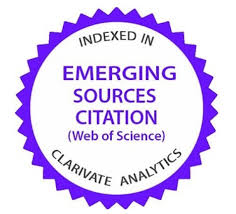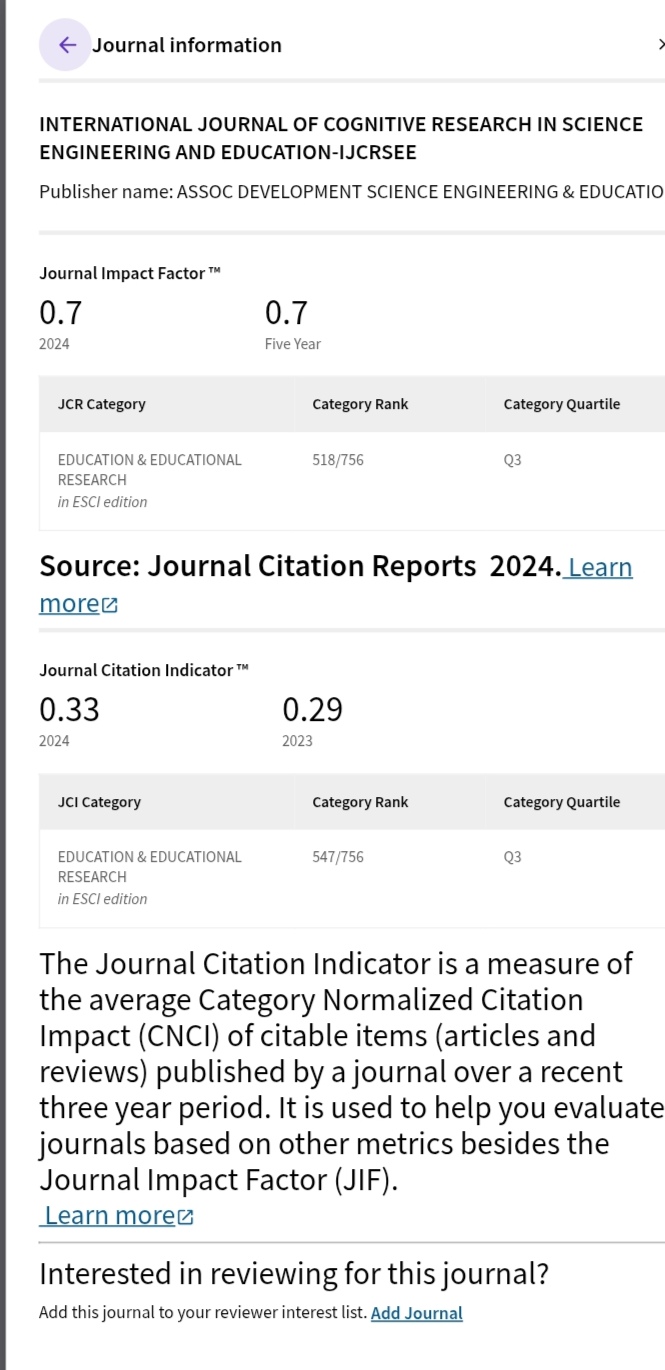CONTINUOUS QUALITY IMPROVEMENT (CQI) FRAMEWORK: A CASE OF INDUSTRIAL ENGINEERING DEPARTMENT
DOI:
https://doi.org/10.5937/IJCRSEE1701107SKeywords:
Outcomes based education, continuous quality improvement framework, Bloom’s Taxonomy, Outcomes based accreditation, program learning outcomes, course learning outcomesAbstract
This paper aims to present an educational framework for outcomes based continuous quality improvement. Well defined program outcomes, program educational objectives and assessment process have been developed to ensure graduates’ outcomes achievement. Direct and indirect tools have been used for assessment process. Course evaluation surveys, alumni surveys, and employer surveys have been deployed for indirect outcome assessment. Exams, quizzes, assignments and projects, on the other hand, have been used for direct outcome assessment. In developed framework, the educational processes committees and facilities committees have been integrated to continuously evaluate and monitor the educational processes. Furthermore, program outcomes and course learning outcomes are proposed to be evaluated and continuously monitored by programs goals committee and continuous course improvement committee respectively. Forms and procedures have been developed to assess student outcomes.
Downloads
References
Almarshoud, A. F. (2011). Developing a rubric-based framework for measuring the ABET outcomes achieved by students of electric machinery courses. International Journal of Engineering Education, 27(4), 859. http://www.ijee.ie/contents/c270411.html
Besterfield-Sacre, M., Shuman, L. J., & Wolfe, H. (2002). Modeling undergraduate engineering outcomes. International Journal of Engineering Education, 18(2), 128-139. http://www.ijee.ie/articles/Vol18-2/IJEE1269.pdf
Blumenfeld, P. C., Soloway, E., Marx, R. W., Krajcik, J. S., Guzdial, M., & Palincsar, A. (1991). Motivating project-based learning: Sustaining the doing, supporting the learning. Educational psychologist, 26(3-4), 369-398. http://dx.doi.org/10.1080/00461520.1991.9653139
Boerboom, T. B., Stalmeijer, R. E., Dolmans, D. H., & Jaarsma, D. A. (2015). How feedback can foster professional growth of teachers in the clinical workplace: A review of the literature. Studies in Educational Evaluation, 46, 47-52. http://dx.doi.org/10.1016/j.stueduc.2015.02.001
Borsoto, L. D., Lescano, J. D., Maquimot, N. I., Santorce, M. J. N., Simbulan, A. F., & Pagcaliwagan, A. M. (2014). Status Of Implementation And Usefulness Of Outcomes-Based Education In The Engineering Department Of An Asian University. Asian Journal of Management Science and Economics, 1(1). http://www.multidisciplinaryjournals.com/wp-content/uploads/2014/02/STATUS-OF-IMPLEMENTATION.pdf
Bouslama, F., Lansari, A., Al-Rawi, A., & Abonamah, A. A. (2003). A novel outcome-based educational model and its effect on student learning, curriculum development, and assessment. Journal of Information Technology Education, 2, 203-214. http://www.jite.informingscience.org/documents/Vol2/v2p203-214-22.pdf
Bresciani, M. J. (2006). Outcomes-based academic and co-curricular program review: A compilation of institutional good practices. Stylus Publishing, LLC. (ISBN: 1-57922-140-8).
Chalmers, D., & Gardiner, D. (2015). An evaluation framework for identifying the effectiveness and impact of academic teacher development programmes. Studies in Educational Evaluation, 46, 81-91. http://dx.doi.org/10.1016/j.stueduc.2015.02.002
Davis, M. H. (2003). Outcome-based education. Journal of veterinary medical education, 30(3), 258-263. http://dx.doi.org/10.3138/jvme.30.3.258
Jahanzaib, M., & Akhtar, K. (2005). Prioritizing key quality indicators for engineering education using analytical hierarchical process (AHP): Case study. (pp. 1-12). In Proceedings of Pakistan’s 4th conference on quality assurance in education, organized by Pakistan Institute of Quality Control, Lahore on (pp. 17-18).
Kapfer, M. B. (1971). Behavioral objectives in curriculum development: selected readings and bibliography. Educational Technology. (ISBN: 0-87778-001-3)
King, J. A., & Evans, K. M. (1991). Can we achieve outcome-based education. Educational Leadership, 49(2), 73-75. http://ascd.com/ASCD/pdf/journals/ed_lead/el_199110_king.pdf
Laguador, J. M., & Dotong, C. I. (2014). Knowledge versus Practice on the Outcomes-Based Education Implementation of the Engineering Faculty Members in LPU. International Journal of Academic Research in Progressive Education and Development, 3(1), 63-74. http://dx.doi.org/ 10.6007/IJARPED/v3-i1/640
Learning, P. B. (2001). Speaking of Teaching. (Winter 2001, 11(1), 1-6. Stanford University Newsletter on Teaching. http://www.konstruktivismus.uni-koeln.de/didaktik/problembased/problem_based_learning.pdf
Majid, F. A. (2008). The use of reflective journals in outcome-based education during the teaching practicum. Malaysian Journal of ELT Research, 4.http://s3.amazonaws.com/academia.edu.docu-ments/13774581/faizah_v2.pdf?AWSAccessKeyId=AKIAJ56TQJRTWSMTNPEA&Ex-pires=1483958766&Signature=O6K6z8lc2P8RL1ggm6HlE6i9tcE%3D&response-con-tent-disposition=inline%3B%20filename%3DThe_Use_of_Reflective_Journals_in_Outcom.pdf
Manual of accrediation Engineering Accrediation Board. (2014). Retrieved may 20, 2015, from http://www.pec.org.pk/downloadables/Accreditation/PEC%20OBA-Manual%202014.pdf
McGourty, J., Shuman, L., Besterfield-Sacre, M., Atman, C., Miller, R., Olds, B., ... & Wolfe, H. (2002). Preparing for ABET EC 2000: Research-based assessment methods and processes. International Journal of Engineering Education, 18(2), 157-167. http://drjj.uitm.edu.my/DRJJ/MQAGGPAS-Apr2011/ABET-LO-CRITERIA/ABET-Assessment-IJEE1278.pdf
Mohammad, A. W., & Zaharim, A. (2012). Programme outcomes assessment models in engineering faculties. Asian Social Science, 8(16), 115. http://dx.doi.org/10.5539/ass.v8n16p115
Mokhtar, S. A., Puteh, S., & Anuar, S. M. S. (2014). OBE Measurement System in Malaysian Institute of Information Technology Universiti Kuala Lumpur. In 2014 5th International Conference on Intelligent Systems, Modelling and Simulation (pp. 12-17). IEEE. http://dx.doi.org/10.1109/ISMS.2014.10
Othman, N. T. A., Misnon, R., Abdullah, S. R. S., Kofli, N. T., Kamarudin, S. K., & Mohamad, A. B. (2011). Assessment of programme outcomes through exit survey of Chemical/Biochemical Engineering students. Procedia-Social and Behavioral Sciences, 18, 39-48. http://dx.doi.org/10.1016/j.sbspro.2011.05.007
Patil, A., & Codner, G. (2007). Accreditation of engineering education: review, observations and proposal for global accreditation. European journal of engineering education, 32(6), 639-651. http://dx.doi.org/10.1080/03043790701520594
Rajaee, N., Junaidi, E., Taib, S. N. L., Salleh, S. F., & Munot, M. A. (2013). Issues and challenges in implementing outcome based education in engineering education. International Journal for Innovation Education and Research, 1(4), 1-9. http://ir.unimas.my/id/eprint/1168
Rashid, M. H. (2012). The Process of Outcome-Based Education-Implementation, Assessment and Evaluations, ASEE international forum, http://www.asee.org/public/conferences/27/papers/8242/view
Sekhar, C. R., Farook, O., & Bouktache, E. (2008). Continuous improvement process based on outcome based education. In Proceedings of the 2008 IAJC-IJME International Conference. Accessed March (Vol. 5, p. 2013). http://www.ijme.us/cd_08/PDF/31_ENG107.pdf
Spady, W. G. (1994). Outcome-Based Education: Critical Issues and Answers. American Association of School Administrators. http://files.eric.ed.gov/fulltext/ED380910.pdf
Spady, W. G., & Marshall, K. J. (1991). Beyond Traditional Outcome-Based Education. Educational Leadership, 49(2), 67-72. https://eric.ed.gov/?id=EJ432789
Student Outcomes and Program Educational Objectives. (2015). Retrieved july 7, 2015, from http:/miamioh.edu:http://miamioh.edu/cec/academics/departments/mme/about/student-outcomes/index.html
White, H. (2001). Getting started in problem-based learning. The power of problem-based learning, 69-78. https://books.google.com.pk/books?hl=en&lr=&id=5gJu7IKBC98C&oi=fnd&pg=PA69&dq=White,+h.+(2001).+Problem+based+learning&ots=tD9n_otAbC&sig=FcjguN714fdt6UNvJFJn1R0AvpQ#v=onepage&q&f=false Volkwein, J. F., Lattuca, L. R., Terenzini, P. T., Strauss, L. C., & Sukhbaatar, J. A. V. Z. A. N. (2004). Engineering change: A study of the impact of EC2000. International Journal of Engineering Education, 20(3), 318-328. http://www.ijee.ie/articles/Vol20-3/IJEE2497.pdf
Published
How to Cite
Issue
Section
License
Copyright (c) 2017

This work is licensed under a Creative Commons Attribution-NonCommercial-NoDerivatives 4.0 International License.











